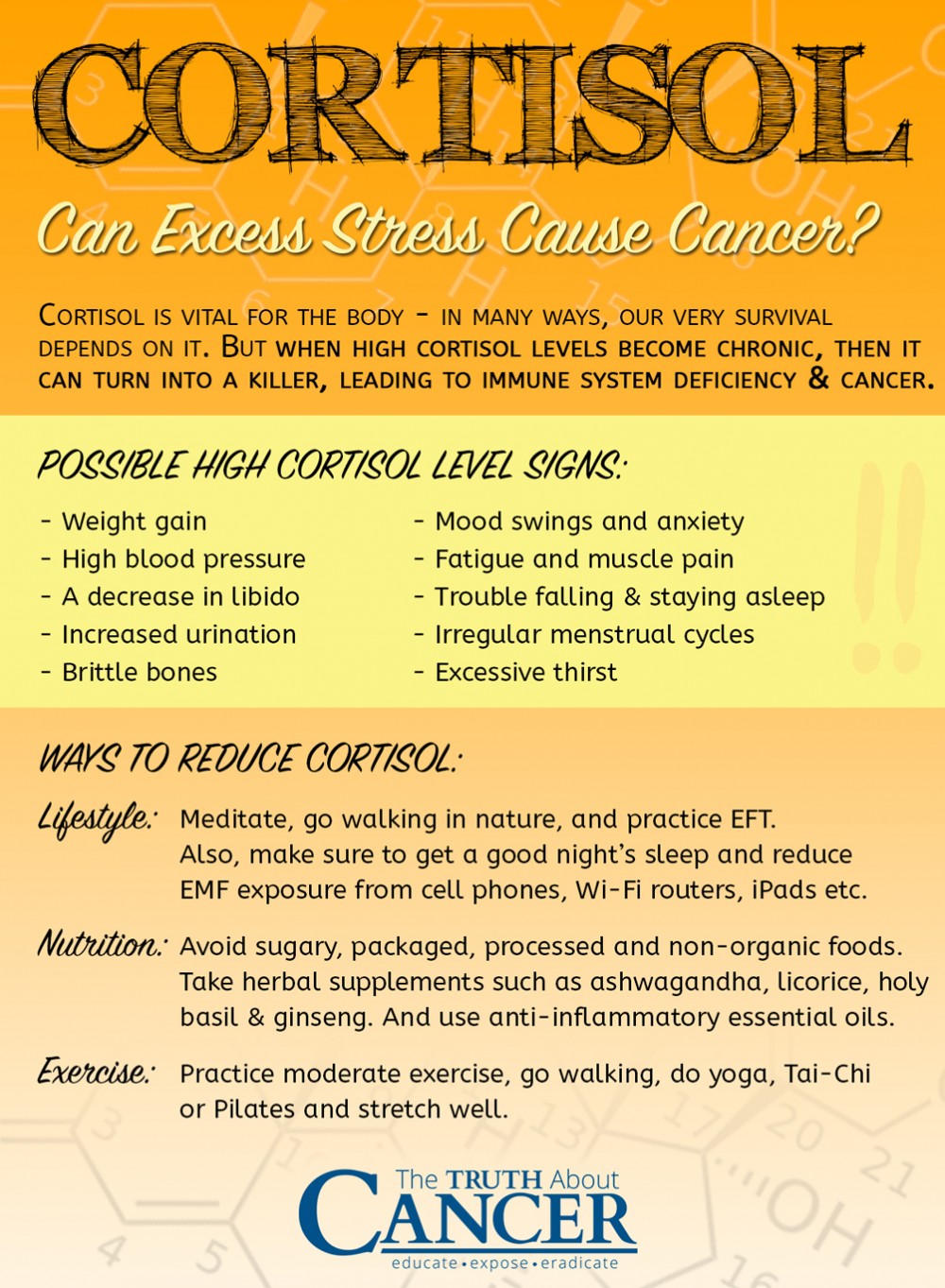The stress hormone, cortisol, is public health enemy number one. Scientists have known for years that elevated cortisol levels: interfere with learning and memory, lower immune function and bone density, increase weight gain, blood pressure, cholesterol, heart disease… The list goes on and on.
Chronic stress and elevated cortisol levels also increase risk for depression, mental illness, and lower life expectancy. In fact, epidemiological and clinical studies over the past 30 years have provided strong evidence for links between chronic stress, depression and social isolation and cancer progression.

What Is Cortisol?
Cortisol is a steroid hormone that is secreted by the adrenal glands and has two major functions in the body: stimulating the breakdown of protein and fat to provide metabolites that can be converted to glucose in the liver and also, reacting in response to stress.
Cortisol is often referred to as the “stress hormone”. We need cortisol to survive and to help us cope with stress. When cortisol is released in response to stress, it is meant to be elevated and used only for short periods of time. If your cortisol levels remain elevated, it can actually do damage to your body.
The hormone cortisol is often seen in a negative light. It is commonly associated with “stress” and the many harmful effects that it can have on the body. In reality, cortisol is vital for the body ? in many ways, our very survival depends on it. Serious issues can arise, however, when high cortisol levels become chronic. Then it can turn into a killer, leading to immune system deficiency and even cancer.
How Does Cortisol Connect With Cancer?
There are numerous studies that suggest that cortisol levels tend to be higher overall and irregular in their daily patterns in patients with breast cancer. A landmark study conducted in 2000 by Stanford University found that 65% of advanced breast cancer patients had abnormal cortisol levels during the day (either abnormal peak periods or consistently flat). What’s more, mortality rates were significantly higher in these women than in the remaining roughly 35% whose cortisol levels were normal.
The researchers also found that the women with abnormal cortisol levels had fewer Natural Killer Cells, which played a major role in their lack of ability to curtail breast cancer metastasis. Recent studies have found the same correlation in men with prostate cancer. Amongst these is a 2016 study by the University of Buenos Aires that found significantly higher daytime cortisol levels in middle-aged men who had prostate cancer versus those who did not.
Stress, Hormones & Cancer
Cortisol also raises glucose levels within normal cells. I am sure you have read what cancer cells love to feed on? You guessed it. Sugar!
Rising glucose levels in the body increases the acidity of the internal environment. An acidic internal environment is also an anaerobic one and the perfect environment for pathogens to take hold. Besides cancer, these include opportunistic fungi and bacterium. The waste products from these entities add another level of toxicity to the mix.
Interestingly, when cortisol is allowed to do its job in short bursts like it was meant to do, it is responsible for a “ramping up” of immune system responses. When high cortisol levels are left for too long, however, the reverse begins to happen. Cortisol begins to deteriorate the functions of the immune system (some researchers think the hormone does this to prevent an autoimmune response).

Signs that you may be suffering from high cortisol levels include:
- Weight gain (especially around the midsection)
- Mood swings and anxiety
- Fatigue and muscle pain
- Trouble falling and staying asleep
- Irregular menstrual cycles
- High blood pressure
- A decrease in libido
- Increased urination
- Brittle bones
- Excessive thirst

Photo credit: thetruthaboutcancer.com
Ways to Slow Down and De-Stress:
Meditation is a proven way to go about doing this. Here are some other stress-reducing and cortisol-lowering activities:
- Consider journal writing, walking, being in nature, practicing EFT (Emotional Freedom Technique or Tapping), or doing yoga or tai chi
- Moderate exercise, getting a good night’s sleep, and reducing EMF exposure from cell phones, Wi-Fi routers, and other electronics are all ways to make sure that cortisol and other stress hormones stay in balance
- Consider herbal supplements such as ashwagandha, licorice, holy basil, and ginseng
- According to Dr. Josh Axe, the anti-inflammatory essential oils lavender, myrrh, frankincense, and bergamot have all shown to lower cortisol levels directly

